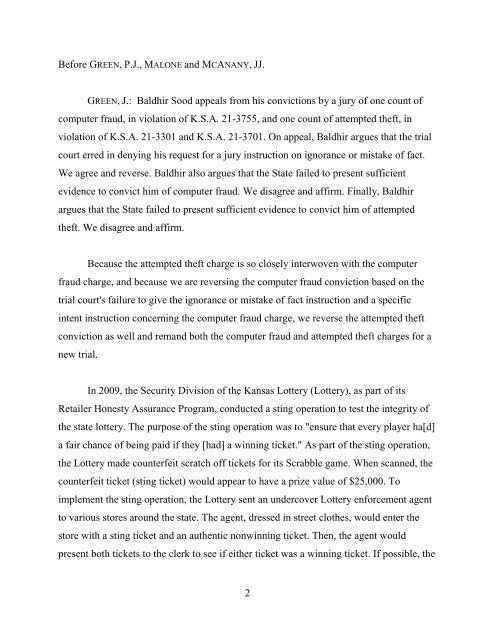Kansas Court of Appeals - 105930 â State v. Sood
Kansas Court of Appeals - 105930 â State v. Sood
Kansas Court of Appeals - 105930 â State v. Sood
Create successful ePaper yourself
Turn your PDF publications into a flip-book with our unique Google optimized e-Paper software.
Before GREEN, P.J., MALONE and MCANANY, JJ.<br />
GREEN, J.: Baldhir <strong>Sood</strong> appeals from his convictions by a jury <strong>of</strong> one count <strong>of</strong><br />
computer fraud, in violation <strong>of</strong> K.S.A. 21-3755, and one count <strong>of</strong> attempted theft, in<br />
violation <strong>of</strong> K.S.A. 21-3301 and K.S.A. 21-3701. On appeal, Baldhir argues that the trial<br />
court erred in denying his request for a jury instruction on ignorance or mistake <strong>of</strong> fact.<br />
We agree and reverse. Baldhir also argues that the <strong>State</strong> failed to present sufficient<br />
evidence to convict him <strong>of</strong> computer fraud. We disagree and affirm. Finally, Baldhir<br />
argues that the <strong>State</strong> failed to present sufficient evidence to convict him <strong>of</strong> attempted<br />
theft. We disagree and affirm.<br />
Because the attempted theft charge is so closely interwoven with the computer<br />
fraud charge, and because we are reversing the computer fraud conviction based on the<br />
trial court's failure to give the ignorance or mistake <strong>of</strong> fact instruction and a specific<br />
intent instruction concerning the computer fraud charge, we reverse the attempted theft<br />
conviction as well and remand both the computer fraud and attempted theft charges for a<br />
new trial.<br />
In 2009, the Security Division <strong>of</strong> the <strong>Kansas</strong> Lottery (Lottery), as part <strong>of</strong> its<br />
Retailer Honesty Assurance Program, conducted a sting operation to test the integrity <strong>of</strong><br />
the state lottery. The purpose <strong>of</strong> the sting operation was to "ensure that every player ha[d]<br />
a fair chance <strong>of</strong> being paid if they [had] a winning ticket." As part <strong>of</strong> the sting operation,<br />
the Lottery made counterfeit scratch <strong>of</strong>f tickets for its Scrabble game. When scanned, the<br />
counterfeit ticket (sting ticket) would appear to have a prize value <strong>of</strong> $25,000. To<br />
implement the sting operation, the Lottery sent an undercover Lottery enforcement agent<br />
to various stores around the state. The agent, dressed in street clothes, would enter the<br />
store with a sting ticket and an authentic nonwinning ticket. Then, the agent would<br />
present both tickets to the clerk to see if either ticket was a winning ticket. If possible, the<br />
2

















